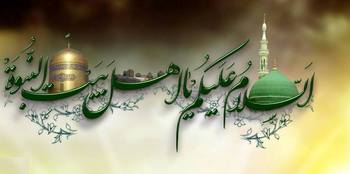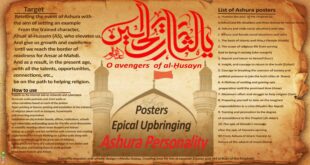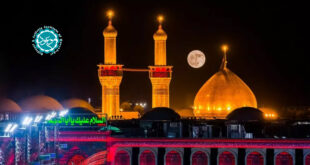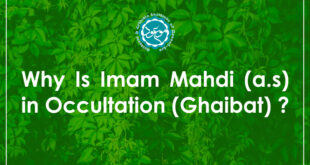In Madina, the Prophet presented them with proof and facts about Islam’s eternal truth, citing references from the previously revealed Scriptures, but the Christians’ irrational obstinacy prevented them from seeing the manifest truth. In the end the two parties decided to meet at an open place and invoke divine curse and punishment upon the lying side. Allah thereby ordered His Prophet to take along with him his immediate family to the meeting ground for the Mubahala.
“And whosoever disputes with you concerning this after the knowledge that has come to you, say: ‘Come now, let us call our sons and your sons, our women and your women, ourselves and yourselves, then let us earnestly pray for Allah’s curse upon the ones who lie.'”
Holy Qur’an (3:61)
The Christian elders came to the venue with their whole flock, and the Prophet as ordered by Allah came with his immediate family members, namely: daughter Fatimah, son in-law Ali and their two children, Hasan and Husayn. Never had the Christians seen such enlightened visages before. The moment the Chief Priest beheld Prophet Muhammad [s] and his noble family, he was filled with awe. He realised that without doubt truth was with this blessed group of five and most surely Allah will respond to Muhammad [s] and his family’s invocation if they choose to curse and destroy the Christians of Najran. Thus the Christians backed away from the challenge of Mubahala, and wisely came to terms with the Prophet, pledging to pay an annual tribute to the Muslims.
10. The Farewell Pilgrimage
In the tenth year of the Hijra, the Messenger of Allah [s] performed the Hajj (pilgrimage), with all his wives and a fairly large number of his Companions.
He reached Makkah on the 4th of Dhul Hijja and was soon joined by Ali [a], who hastened back from his successful missionary deputation to Yemen. During the Hajj ceremonies, the Prophet addressed a great multitude from Mount Arafat, in words which are eternal to this day in the hearts of believers. After praising the Almighty, he expounded the laws and tenets of Islam and abolished all existing practices of the days of Jahiliyah, charging the gathering to inform those not present and also to convey to posterity his eternal message.
The famous tradition called ‘Thaqalain’ was part of this sermon and we reproduce it below from ‘Sahih Tirmidhi’ for the benefit of our readers.
“I have been summoned (by Allah) and the moment is near for me to answer (to die). I leave among you the ‘Thaqalain’ (two precious things): the Book of Allah and my progeny; Allah’s Book is like a rope extending from heaven to earth, and my progeny are the Ahlul-Bayt. The Merciful informed me that the two will not part with each other until they meet me at the pool (of Kawther in Paradise). I warn you against deserting them.”
11. Ghadir Khum
After performing the Hajj, he bade farewell to his native Makkah and set out for Madina. When the great procession reached the place from where the routes of the different caravans coming from various points of Arabia normally parted, suddenly the signs of divine revelation appeared and he stopped at a place called al-Juhfa near the spring (ghadir) of Khum. The Archangel Gabriel came with the following verse in order to impress the urgency of the divine command:
“O Prophet proclaim what has been revealed to you from your Lord, for if you do it not, you have not conveyed His message; and Allah will protect you from the (evil designs of) people…”
Holy Qur’an (5: 67)
At once the Prophet ordered the whole party to be assembled, even summoning back those who had already left, for he had an important message to be delivered.
A pulpit made of camel saddles was hastily set-up. Ascending it, he delivered a sermon asking the people to be witness that he had faithfully performed the task of Prophethood entrusted to him by the Almighty.
The multitude cried in one: “We bear witness O Messenger of Allah.”
He asked, who in their opinion was more worthy of obedience than their souls, to which they replied that Allah and His Prophet know better.
Then he said: “O people! Allah is my Maula (Master) and I am the Maula (master) of believers.”
“Verily O Prophet of Allah”, came the unanimous reply.
Prophet Muhammad [s] then bent down and lifting up Ali bin Abi Talib [a] in his hands, showed him to the vast crowd and proclaimed those famous words, which guaranteed the continuation of divine leadership:
“For whomsoever I am Maula (master), this Ali is his Maula (master)…”
Thrice he proclaimed these words before descending the pulpit, relieved by having performed the great task which would save the Ummah from going astray.
The great multitude of Muslims surged towards Ali bin Abi Talib [a], felicitating him on his divine appointment. According to such famous scholars as Zamakhshari and Nasai, the first one to congratulate and swear allegiance (bai’ah) to Imam Ali [a] was Umar bin Khattab, who later became the second Caliph.
Gabriel descended again with another revelation, showing that the Almighty was pleased with His Prophet for having excellently performed the great final mission to mankind.
“…Today have I perfected unto you your religion and completed upon you My blessings and approved for you Islam as your religion…”
Holy Qur’an (5:3)
This most important task ensured the continuity of divine guidance. Since the Prophets were divinely appointed, so should be the successors or trustees of the Prophets, especially so in the case of Islam, which is the final message to the human race.
All scholars and historians have testified that the event of Ghadir Khum[11] did take place, and moreover books of Hadith are witness that on many and occasion, the Prophet had emphasised his cousin’s pre-eminence, over all other Muslims.
12. The Prophet’s Death
Two months after his return to Madina, the Messenger of Allah fell ill, Madina wore a look of gloom, because for a fortnight, the Prophet of Islam was confined in bed. The dawning of 28th of the lunar month of Safar proved to be fateful, for on that day the ‘Mercy to the worlds’ although weak with fever made his way to the mosque to lead the prayers, which also proved to be for the last time. Following a brief speech he returned to the house and after giving necessary instructions to his divinely ordained successor Imam Ali [a], he breathed no more. The sad day marked the end of final Prophethood.
Allah, through His last and greatest Messenger has revealed the perfect and the most comprehensive set of laws for the entire human race, a constitution, which is capable of catering to the needs of all generations till doomsday. Now the need for further revelations will no more arise, for the Almighty in His Eternal Wisdom has embodied each and everything in the Holy Qur’an and taken upon Himself the responsibility of guarding it from interpolation. Moreover the Prophet practically showed the implementation of divine laws. The Qur’an together with the Prophet’s Sunnah (traditions) is to remain a guiding light for all mankind, and to ensure their correct meaning and application, Allah granted the leadership of the Ummah to the Prophet’s infallible household, the Ahlul-Bayt, who are the torch bearers of guidance for all Muslims.
Prophet Muhammad [s] was laid to rest in his mosque, and an aggrieved Imam Ali [a] performed the last rites of his noble cousin and father-in-law. He was survived by his daughter Fatimah and her two sons.
Today the grave of the Prophet is the site of pilgrimage and veneration for Muslims from all over the globe.
[10] Mubahala means to invoke Allah’s curse upon the lying side when two parties are contesting for truth.
[11] For more details on the historic event of Ghadir Khum refer to such famous books as: Musnad Ahmad bin Hanbal, Part 1, page 118 & 119, part 4, page 281-370-372-373, part 5, page 347-370. Sunan bin Maja, Chapter ‘Merits of Ali’. Mustadrik al-Hakim, part 3, page 109. Bin Kathir’s History, part 5, page 210
 Mouood Mouood English Edition
Mouood Mouood English Edition




